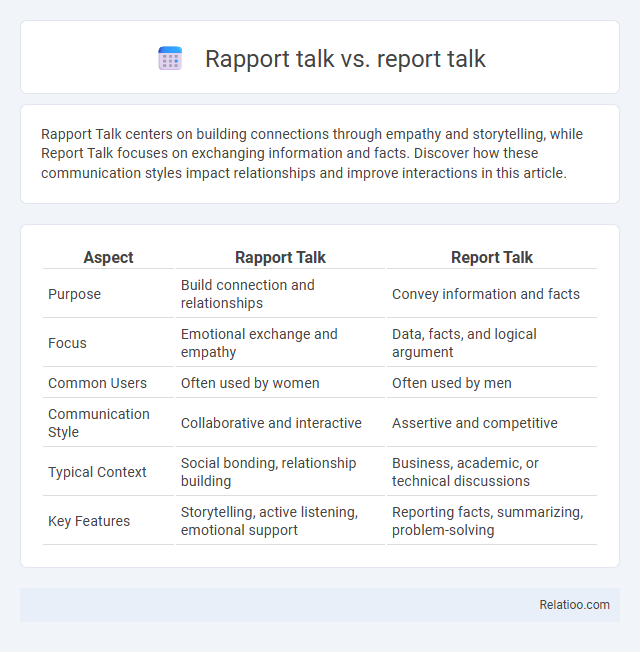Rapport Talk centers on building connections through empathy and storytelling, while Report Talk focuses on exchanging information and facts. Discover how these communication styles impact relationships and improve interactions in this article.
Table of Comparison
| Aspect | Rapport Talk | Report Talk |
|---|---|---|
| Purpose | Build connection and relationships | Convey information and facts |
| Focus | Emotional exchange and empathy | Data, facts, and logical argument |
| Common Users | Often used by women | Often used by men |
| Communication Style | Collaborative and interactive | Assertive and competitive |
| Typical Context | Social bonding, relationship building | Business, academic, or technical discussions |
| Key Features | Storytelling, active listening, emotional support | Reporting facts, summarizing, problem-solving |
Understanding Rapport Talk vs Report Talk
Rapport Talk emphasizes building connections through empathetic and collaborative communication, often associated with women, while Report Talk centers on conveying information and status, typically linked to men. Understanding the distinctions between these communication styles helps you navigate gender dynamics more effectively by recognizing the intentions behind conversational approaches. This awareness enhances interpersonal interactions by adapting your communication to meet the needs of diverse social contexts.
Key Differences Between Rapport Talk and Report Talk
Rapport Talk focuses on building relationships and emotional connections through sharing personal stories and experiences, while Report Talk centers on exchanging information, facts, and problem-solving efficiently. This communication style difference is often linked to gender dynamics, with women typically engaging in Rapport Talk to foster empathy and social bonds, and men opting for Report Talk to assert status or convey data. Understanding these key differences can help you navigate conversations more effectively by recognizing the intent and preferred communication style behind the interaction.
The Origins of Rapport and Report Talk Concepts
Rapport Talk and Report Talk concepts originated from sociolinguist Deborah Tannen's research on gendered communication styles in the 1980s, highlighting differences in conversational norms between men and women. Rapport Talk emphasizes building connections and fostering relationships through sharing personal experiences, often associated with female communication patterns, while Report Talk focuses on exchanging information and asserting status, typically linked to male communication styles. Understanding these origins can help you navigate gender dynamics in communication more effectively by recognizing how conversational goals differ based on social conditioning.
How Gender Influences Communication Styles
Gender influences communication styles through distinct patterns such as Rapport Talk, typically used by women to build connections and foster empathy, versus Report Talk, commonly employed by men to exchange information and assert status. Your understanding of these differences can enhance interpersonal interactions by recognizing that women often prioritize relational communication, while men emphasize task-oriented dialogue. Awareness of these gender-based communication preferences helps navigate social and professional conversations more effectively.
Examples of Rapport Talk in Everyday Conversations
Rapport Talk emphasizes building connections and empathy, commonly seen when friends share personal stories or express feelings to understand each other better, such as discussing weekend experiences or family matters. In contrast, Report Talk focuses on exchanging information or facts, like giving directions or presenting news updates. Your ability to engage in Rapport Talk strengthens relationships by fostering emotional bonds and mutual support through active listening and personal disclosure.
Examples of Report Talk in Professional Settings
Report talk in professional settings typically involves clear, concise communication focused on facts and data, such as presenting sales figures during a quarterly meeting or delivering a project update to stakeholders. Men often prefer this style to convey information efficiently and assert expertise, exemplified by a manager outlining team performance metrics or negotiating contract terms with clients. This contrasts with rapport talk, more common in informal interactions, which emphasizes relationship building and emotional connection.
Impact of Communication Styles on Relationships
Rapport Talk emphasizes emotional connection and empathy, fostering trust and understanding in relationships, while Report Talk centers on information exchange, promoting clarity and problem-solving. Gender dynamics often influence these styles, with women typically favoring Rapport Talk and men Report Talk, which can lead to misunderstandings if unrecognized. Your awareness of these differences enhances communication effectiveness and strengthens interpersonal bonds.
Strategies for Balancing Rapport and Report Talk
Balancing Rapport Talk and Report Talk requires recognizing that Rapport Talk fosters emotional connection and empathy, often preferred in female communication, while Report Talk emphasizes information exchange and status, commonly associated with male communication styles. Your strategies should include active listening to validate emotions alongside clear, concise information sharing to bridge gender communication dynamics effectively. Employing adaptive language and situational awareness enhances understanding and collaboration between diverse conversational approaches.
Common Misunderstandings Between Rapport and Report Talk
Rapport Talk, typically associated with women, emphasizes building relationships and emotional connections through conversation, while Report Talk, often linked to men, focuses on exchanging information and asserting status. Common misunderstandings arise when Rapport Talk is mistaken for gossip or triviality, and Report Talk is wrongly perceived as impersonal or confrontational. These misinterpretations overlook the complementary communicative functions both styles serve in gender dynamics and social interactions.
Enhancing Communication by Recognizing Talk Styles
Understanding the distinctions between Rapport Talk, typically characterized by building connections and empathy, and Report Talk, focused on exchanging information and facts, enables you to tailor communication strategies for diverse gender dynamics. Recognizing that women often engage more in Rapport Talk while men tend toward Report Talk helps enhance conversations by fostering mutual respect and effective listening. Applying this awareness in your interactions improves clarity, cooperation, and emotional intelligence across personal and professional settings.

Infographic: Rapport Talk vs Report Talk
 relatioo.com
relatioo.com